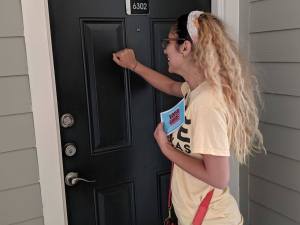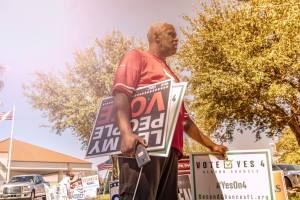Many of the nation’s most savvy grantmakers and donors who seek to make lasting structural change on important issues give to 501(c)4 organizations, in addition to their sizable investments in more traditional 501(c)3 nonprofits. In their own words, here’s why they do it and why it matters for the communities and causes they support.
Editor’s note: This article was written before the murder of George Floyd by police in Minneapolis and the subsequent uprisings in more than 400 cities. Please see the dear colleague letter that accompanies this issue of Responsive Philanthropy for more context.
Open Society Foundations
The Open Society Foundations supports advocacy organizations because good policy saves lives, advances equality and protects our democracy. When government budgets run into the billions of dollars and affect millions of people, effective and lasting change only happens when laws and policies are revised, approved or defeated.
Through the Open Society Policy Center (OSPC), our 501(c)(4) arm, we back creative and courageous efforts to advance a more just, inclusive and democratic America.
We are proud of our partnership with frontline organizations demanding better lives for all Americans and our neighbors around the world.
Together, we have helped to reduce racially disparate sentencing laws, check executive war powers, humanize our immigration system, protect voting rights and anti-corruption rules, advance reforms of the pharmaceutical industry and Wall Street, and block countless efforts to enshrine hate, repression and division into federal, state and local law.
Working to influence U.S. foreign policy, OSPC supported the expansion of bans on funding foreign military units that have engaged in extrajudicial killing and kidnappings, and supported Sen. JohnMcCain’s successful effort to end the CIA’s detention and interrogation program.
The powerful often have enough advocacy muscle and money to choke out the voices of the people, especially the marginalized. Open Society is proud to have increased our spending in the face of recent escalations of bigoted and anti-democratic policies, and hope other philanthropic institutions will do so as well.
Tom Perriello, Executive Director
Open Society-U.S.
Civic Participation Action Fund
The Civic Participation Action Fund (CPAF) is exclusively a c(4) grantmaker. When the Atlantic Advocacy Fund (AAF) created CPAF, it did so because it recognized that changes in public policy are often necessary to create the kind of change AAF was seeking.
Because c(4) organizations can engage in much more direct advocacy than c(3) organizations, they are key players in achieving policy change. These groups can directly lobby elected officials, and they can ask their members and communities to lobby and engage in elections.
Early on, CPAF focused on issue-based work but soon decided to adopt a civic engagement approach to the work.
We recognized that the people and communities whose interests we sought to promote, mostly people of color and low-income communities, often participated in civic engagement activities at rates far lower than their representation in the general population and far lower than their white counterparts.
If their voices were to be heard by the policymakers who were making decisions about issues that directly impacted their lives, they needed to be engaged, and policymakers needed to understand they would be held accountable for their policy positions.
Some voter engagement efforts, such as voter registration and voter education, can be done with c(3)funding.
However, the kinds of messages that directly link candidates to their policy positions, and work on direct issue advocacy like ballot measure campaigns, require c(4) funding.
This type of work can then by translated into political power as the organizations doing the work demonstrate their ability to win elections by mobilizing their communities.
For example, CPAF provided early support for a minimum wage/paid sick leave ballot measure in Arizona in 2016 by giving a grant to LUCHA, an emerging Latinx-led immigrant rights group in the state.
The ballot initiative was overwhelmingly supported by the voters that year and because of LUCHA’s leadership role, the organization has grown in stature, membership and financial viability to become one of the leading powerhouse organizations in the state.
Stephen McConnell and Katherine Peck
Civic Participation Action Fund
Ms. Foundation for Women
After 46 years, the Ms. Foundation expanded out to develop a c(4) arm, and is venturing into supporting c(4)s through our newly formed Ms. Action Fund (MAF). The strategy of the MAF was constructed around the idea of building political power for women of color.
Political power is not just about representation, but the ability to influence outcomes, to change the landscape – the ability to move transformational change on behalf of our communities. We believe that building a more reflective democracy moves us closer to a country where communities of color — women and girls of color, in particular — have political influence.
It has been proven that the health of any nation depends on the support and existence of strong independent women-led structures. Simply put, women of color must have increased power to influence outcomes on the policies and institutions that affect their lives.
We believe that shifting the makeup of U.S. political institutions is tied to increased power among organizations empowered to do 3 main things: hold institutions accountable; govern in partnership with elected officials; and ultimately leverage influence for systemic transformation.
Therefore, while our analysis takes into account electoral opportunities, power for women of color must also include strengthened capacity, infrastructure and influence across the country.
Ms. Action Fund is coming out of the box to put more money into the people closest to the solutions. To build political power for women of color that is truly transformational we have decided to focus on tackling challenges centered around funding, aligned training and infrastructure, and building accessible and culturally competent tools.
Teresa C. Younger, President & CEO
Ms. Foundation for Women

Organizers from Alliance for Youth Action affiliate MOVE Texas distributed
voter guides for the 2018 Midterm Elections.
Ian Simmons
Our smartest opponents have utilized the c(4) playbook for decades. With c(4) resources the Kochs built Americans for Prosperity, spending about $100 million per year persuading voters, writing laws and winning elections throughout the U.S. In states like Wisconsin, their c(4) infrastructure mobilized voters key to Trump’s surprising 2016 election.
The Kochs chose to build their strongest organization with c(4) resources because c(4) resources enable clear and persuasive conversations with voters and lawmakers. Tax-deductible c(3) resources come not only with a tax-deduction but a gag order — restrictions that neuter public conversation.
When we combat agendas fueled by hate or corruption, we must enable organizations to talk plainly with voters, empower the best candidates and win better laws. That usually means using c(4) dollars. If we don’t fight with c(4), we fight with our stronger arm tied behind our backs. When we use c(4), we win more fights.
That’s how the best progressive organizations operate. For example, The Alliance for Youth Action deploys millions of voter guides around the country with c(4) resources, enabling organizers to engage voters directly, unencumbered. They talk openly about candidates who are awful on the issues and those who are awesome; young voters, like all citizens, respond better with clarity. Research shows organizing with such tools is more effective, helping progressives win more power.
Whether we seek to strengthen climate standards, defeat a corrupt president’s re-election, recruit inspiring, diverse candidates or fight for fair elections, building an inclusive America requires the proven power and precision of c(4) fuel.
Ian Simmons, Co-Founder & Principal
Blue Haven Initiative and Democracy Alliance Partner

A major investment of 501(c)4 resources in groups like Florida Rights Restoration Coalition enabled the Voting Rights Restoration for Felons Initiative to be passed in Florida in 2018.
Jason Franklin
Most of my personal giving and that of the donors I advise is c(3) giving supporting community organizing and advocacy to advance racial, social, economic and environmental justice. But I have increasingly layered in c(4) (and political) giving alongside that c(3) funding to help build a more robust ecosystem of work towards social change.
Tax-deductible c(3) giving remains critical for so much work as it supports community building, research, issue education, communications and more. But all of that work gets a powerful boost when we also fund movements to expand into the c(4) realm with lobbying, ballot measure campaigns and electoral work from endorsements to independent expenditures. Growing our c(4) investments into social change movements yields bigger wins and that is worth far more than the tax deduction that we lose.
Take for example Amendment 4 in Florida, the Voting Rights Restoration for Felons Initiative that passed in 2018 and stands to restore the right to vote to an estimated 1.4 million people. We have funded civic engagement efforts in Florida for years (and will continue to do so!), but it took a major investment ofc(4) resources into the Florida Rights Restoration Coalition, New Florida Majority and others to pass the biggest voting rights enfranchisement campaign in a generation. And we must continue to fund their work to implement this landmark law as conservatives attempt to undermine it with illegal modern-day poll taxes and other tactics.
When I review my own giving or help a client develop their philanthropic strategy, a key question I ask is whether shifting types of giving could lead to greater change. Over and over, increasing c(4) and political giving is the answer.
Jason Franklin, Co-Founder & Co-Chair
Solidaire Donor Network and President, Ktisis Capital